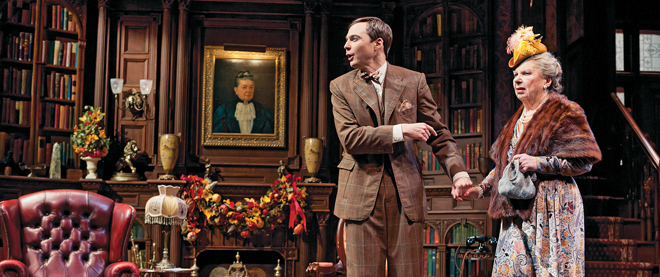As seen on TV: Hollywood celebs strut from screen to stage
Television and movie stars are saving Broadway one limited engagement at a time
Sara Krulwich/The New York Times
Share

Broadway theatre used to have its own stars who could run a show for a year. Now it rents stars from Hollywood for limited engagements. One of the big shows this summer is a revival of the magic-rabbit play, Harvey, starring Jim Parsons of The Big Bang Theory; it will run until Aug. 5, when Parsons’ TV show will take him back to Hollywood. The hottest ticket on Broadway this year was a four-month revival of Death of a Salesman, with Academy Award winner Philip Seymour Hoffman, and James Earl Jones is currently starring in Gore Vidal’s The Best Man for a similar run. “With limited runs you can bring in a lot of the Hollywood and TV stars,” says Charlotte St. Martin, executive director of the trade association the Broadway League. And these stars are keeping Broadway viable.
Producers prefer an indefinite run rather than setting a cut-off date, but shows without stars often have trouble staying afloat. Last year, a revival of the musical Promises, Promises had to close after only 291 performances when Sean Hayes (Will & Grace) and Kristin Chenoweth (GCB) finished their runs. Recently, another ’60s hit, How to Succeed in Business Without Really Trying, was revived for Harry Potter star Daniel Radcliffe, but the show closed four months later, unable to survive with lesser stars such as replacements Darren Criss (Glee) and singer Nick Jonas.
That makes the limited run a less risky proposition than an open-ended run. Film and TV stars, who can’t commit to a long run, can use shorter engagements to do theatre and connect with their fans. Michael Feingold, theatre critic for the Village Voice, says it gives them the opportunity to play “the role they’ve heard about and dreamed of playing for their entire lives—Blanche DuBois or Hamlet or Uncle Vanya.” And for producers, short runs can have an advantage if the star sells tickets. Brian DeVito, a blogger who writes about theatre marketing, explains that a limited run eliminates “the ‘I’ll see it eventually’ mentality. Audiences have to act sooner rather than later to buy tickets.”
What worries some observers about these celebrity-driven productions is that they may hurt the ability of theatre to develop its own stars. When The New York Times profiled Steve Kazee, the lead in the musical Once, it noted that it took him a long time to land a starring role because “big breaks on Broadway are rare these days for young actors who haven’t made their mark in Hollywood first,” a complaint so common that it became part of the plot on Smash, the TV show about a Broadway musical. Feingold says this might “dampen artists working in the field, who’ve come to New York to make a career in the theatre and see its biggest and most profitable segment closed to them.” Mike Nichols, who directed Hoffman in Death of a Salesman, told Deadline.com it used to be possible to make stars out of unknown actors, and “they ran as long as they could stand being in the play.” Without the ability to create instant stars, plays can’t have long runs even if producers want to keep them open.
Still, these productions have helped keep non-musical theatre viable on Broadway. According to a report by Eriq Gardner in Backstage magazine, Broadway achieved “record-breaking attendance” last season thanks in part to the influx of Hollywood stars. And when stars choose roles beyond the usual Broadway fare, they can attract audiences to more challenging scripts. Feingold points to Julia Roberts, who chose a few years ago to star in a limited-run Broadway production of Three Days of Rain, “an intelligent, difficult play by an author of whom most of the ticket buyers had probably never heard.” Other stars might be starting to use their power to champion newer material: Edie Falco, star of Nurse Jackie, announced last month she had agreed to star in a new play by one of the writers on her show, and Oscar nominee Michael Shannon will make his Broadway debut in the contemporary play Grace. When actors achieve film and TV fame, they can leverage it to come back to the theatre. And as for the theatre actors who aren’t stage stars yet, there may be only one option: “to become media stars so that they can come back to the theatre playing the great roles,” as Feingold says.